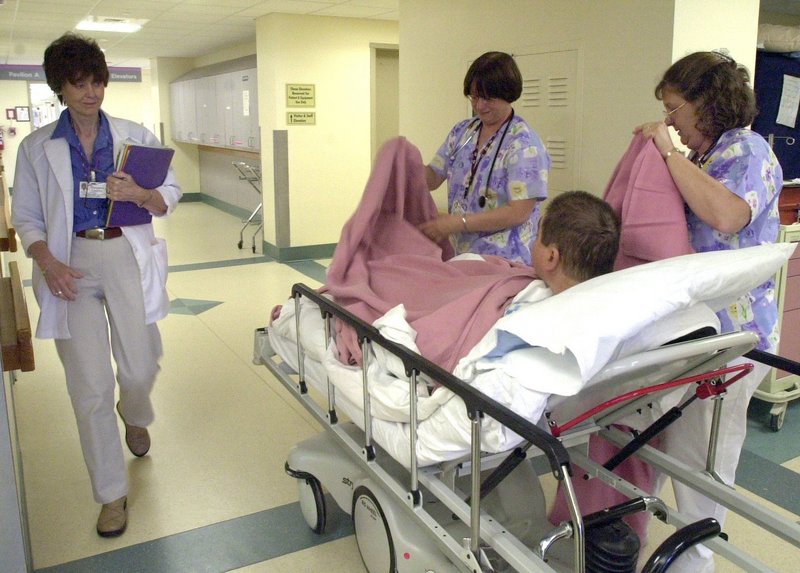AUGUSTA – Maine’s hospitals are pleased that there is bipartisan support for paying the approximately $484 million debt that the state owes for care provided to MaineCare patients dating back to 2009.
There is even bipartisan support for using a portion of the future revenue from the state liquor contract to settle with hospitals.
Unfortunately, the broad support to pay hospitals what they are owed is getting bogged down in Augusta. And that isn’t fair.
It’s not fair, because hospitals are owed millions for care that they have already provided to patients using Maine’s Medicaid program. Those millions of dollars represent heart surgeries, setting broken legs and emergency treatments for asthma as well as other necessary medical care.
The amount Maine was to pay for these services — less than what it cost to provide the services — was set by the Legislature. Thankfully, legislators and the governor came together last session and changed the way that MaineCare pays hospitals so that the debt is no longer accumulating.
The public hearings on the legislation to pay the hospitals were months ago, and most of the questions around the initiative have been answered. So why the delay? There are those in the Legislature who want to make paying the hospital bill contingent on the passage of a separate piece of legislation that would expand eligibility for Medicaid.
Medicaid expansion is a centerpiece of the federal Affordable Care Act. While hospitals support the Medicaid expansion, we vehemently disagree that the expansion should be tied in any way to whether or not the outstanding bills get paid. Hospitals don’t control whether MaineCare gets expanded; they shouldn’t be punished if the expansion fails.
This kind of leveraging of one issue versus another issue is bad policymaking. It is a common tactic in Washington, D.C., and one of the hallmarks of its dysfunction. Trading votes among individual legislators will probably always happen to some extent, but this kind of leveraging should not occur.
Furthermore, failure to pay hospitals for the care they’ve already provided has real financial consequences. When the state doesn’t pay its bills, hospitals can’t pay theirs. Hospitals continue to borrow from lines of credit to meet payroll and pay bills because of the state debt to hospitals.
The average operating margin of Maine’s hospitals is less than 2 percent, and that amount assumes that the state has paid its bills.
Moreover, over the past 12 months, most of Maine’s hospitals have lost money. Uncompensated care, which is the sum of both bad debt and charity care, was about $450 million last year, up $32 million from the year before.
And Maine hospitals are paying about $81 million in taxes to the state (yes, hospitals pay taxes).
As recent headlines have made clear, all of our hospitals are struggling to make ends meet. Having the state them owe millions of dollars isn’t helping.
Maine’s nonprofit community and psychiatric hospitals provide high-quality affordable care to the communities they serve. Our hospitals provide the highest-quality care in the nation, according to the U.S. Department of Health and Human Services. Maine hospitals performed the best in the nation pursuant to Medicare’s new value-based purchasing initiative.
Lawmakers and the governor have a number of challenges ahead of them, including the adoption of a two-year state budget (and Maine hospitals face $50 million in cuts per year under that budget).
Resolving the outstanding hospital debt is an opportunity for the elected officials in Augusta to show the public that they can work together to solve a problem. They are so close.
On behalf of Maine’s hospitals, our patients and our communities, please delay no further. Hospitals have waited long enough.
Steven Michaud is president of the Maine Hospital Association, based in Augusta.
Send questions/comments to the editors.



Success. Please wait for the page to reload. If the page does not reload within 5 seconds, please refresh the page.
Enter your email and password to access comments.
Hi, to comment on stories you must . This profile is in addition to your subscription and website login.
Already have a commenting profile? .
Invalid username/password.
Please check your email to confirm and complete your registration.
Only subscribers are eligible to post comments. Please subscribe or login first for digital access. Here’s why.
Use the form below to reset your password. When you've submitted your account email, we will send an email with a reset code.